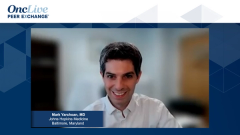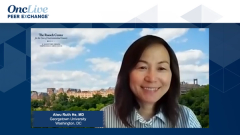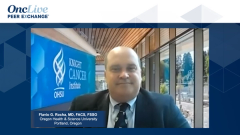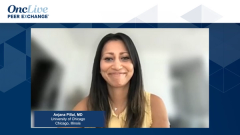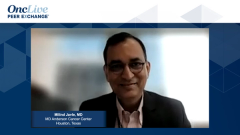
Understanding the Role of Adjuvant Therapy in Biliary Tract Cancers
Experts provide brief perspective on the use of adjuvant treatment approaches for patients with biliary tract cancers.
Episodes in this series

Transcript:
Milind Javle, MD:Flavio, we often see patients in our clinic who have had resected intrahepatic cholangiocarcinoma, extrahepatic cholangiocarcinoma, and then it’s confusing in terms of do we give them capecitabine per the BILCAP study, do you do chemoradiation? Who are the patients who don’t need adjuvant therapy? Can you educate us on this topic?
Flavio G. Rocha, MD, FACS, FSSO: I can give you my perspective certainly, and I think I’ll rely on my colleagues as well to chime in. I think as we’re getting more patients to surgery, this is becoming a very important question. For a long time, there was no adjuvant therapy, and in fact if you look back, the initial trials mainly done in Japan did not show any benefit. BILCAP, as you mentioned, was the first one to really show a benefit, although as you know it took about 10 years to accrue. It was a very mixed population, and the majority of patients had distal cholangiocarcinoma, so it’s always a question as to how applicable [the data] are to other tumor sites. In the end, it is the standard of care that we have. I know there are other trials that are in development, [such as] the ACTICCA trial that had been amended to compare now gem/cis [gemcitabine and cisplatin] with capecitabine. We’re obviously eagerly awaiting those results. We did have the STAMP trial that was presented at ASCO [American Society of Clinical Oncology annual meeting], looking at specifically node-positive hilar cholangio and other extrahepatic cholangiocarcinoma, which did not show a signal. But I certainly don’t think it needs to be abandoned. I think the field is ripe. We did mention earlier about the patients who have MSI [microsatellite instability]-high tumors, what is the role of immunotherapy in the adjuvant setting? I think that’s another area that’s ripe for investigation.
Mark Yarchoan, MD: I’ll just add systemic-therapy wise, BILCAP was a complicated study that has some concerns about the statistics that were done, and whether you include patients who started the drug or you include all comers changes whether it’s positive or negative as a study. There are now some data from Japan with S-1 [oral fluoropyrimidine], which is a similar drug, where the curves are almost superimposable with BILCAP, so I think we have a little more confidence that adjuvant therapy is beneficial in this cancer. Obviously gemcitabine with cisplatin is now the basis of our treatment in advanced disease. It seems logical that we should be moving that to the adjuvant setting, but there was a randomized study of capecitabine versus gemcitabine and cisplatin where gemcitabine and cisplatin did not appear to improve outcomes over capecitabine.
So at least for now, I agree, capecitabine is the closest thing we have to a standard of care for adjuvant therapy. Whether particularly high-risk patients, patients with nodal disease or R1 [microscopic tumor] resections would benefit from radiation, I think is an unanswered question, but many of us would do that. Some of us would add in gemcitabine for particularly high-risk patients based on SWOG S0809 even though that’s a single-arm study. There are a lot of unanswered questions, I wish we had more data.
Transcript edited for clarity.


